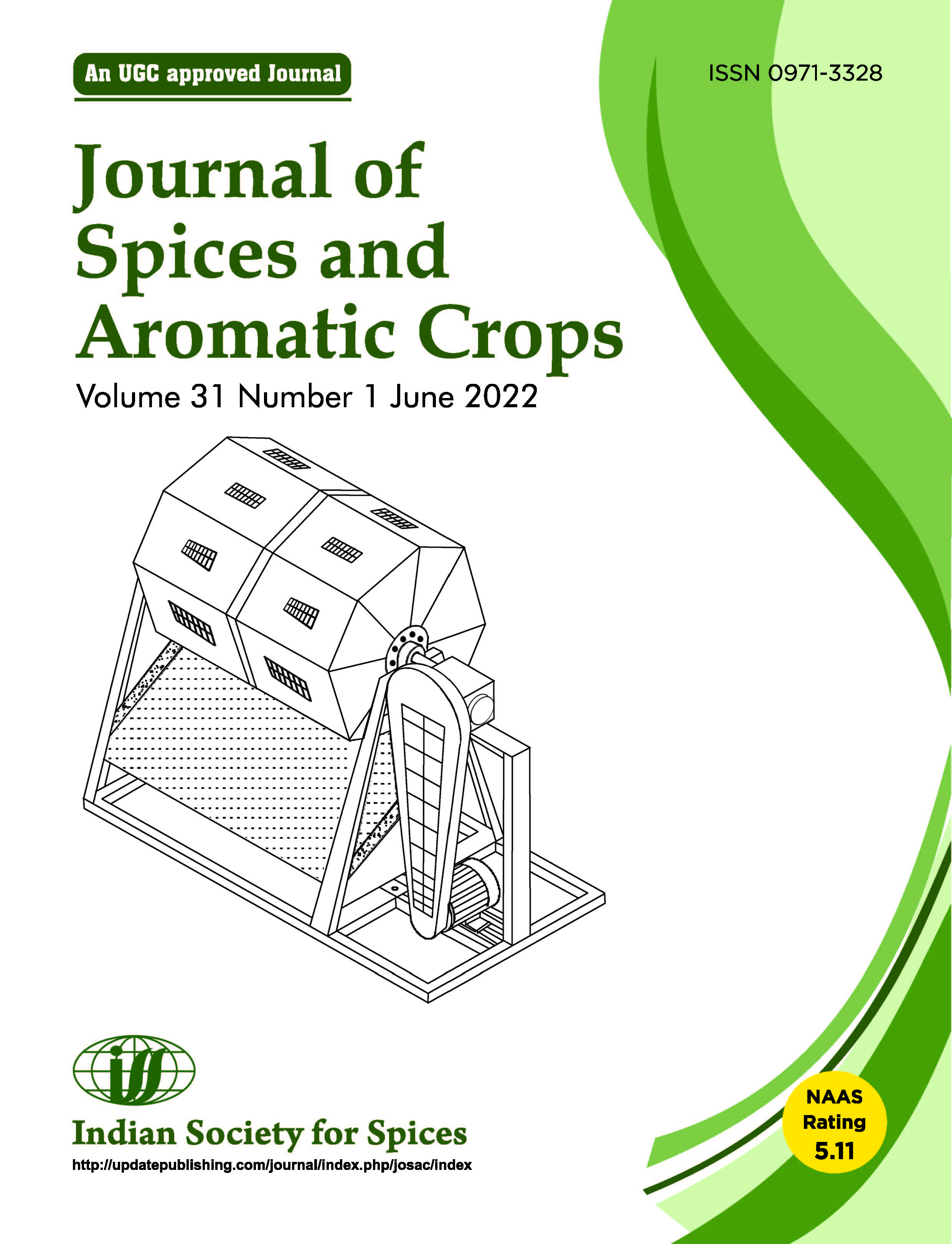Screening of black pepper varieties against anthracnose under nursery conditions
Screening black pepper against anthracnose
DOI:
https://doi.org/10.25081/josac.2022.v31.i1.7354Keywords:
anthracnose, Colletotrichum gloeosporioides, Piper nigrum, pollu diseaseAbstract
Pathogen causing anthracnose of black pepper was isolated from symptomatic leaf sample and was identified as Colletotrichum gloeosporioides on the basis of morphological, cultural and molecular characterization. Later, pot culture experiment was conducted in greenhouse (year 2020-21) to determine resistance/susceptibility of seven different black pepper varieties viz., Arakkulamunda, Doddigya, Karimunda, Malligesara, Panniyur-1, Poonjarmunda and Uddagare, against anthracnose in nursery condition. It was observed that no variety was resistant but Karimunda variety was found to be highly tolerant against the disease. Whereas, Poonjarmunda and Panniyur-1 were classified as susceptible and highly susceptible, respectively.
Downloads
References
Abraham A 2018 The Trend in Export, Import and Production performance of Black pepper in India. Int. J. Pure Appl. Math. 118: 4795–4802.
Bandgar M S, Barhate B G & Raghuwanshi K S 2018 Host range of Colletotrichum gloeosporioides isolated from various crops in western Maharastra. J. pharmacogn. phytochem. 7: 1967–1971.
Biju C N, Ravindran P, Ankegowda S J, Darshana C N & Jashmi K C 2013 Epidemiological studies of black pepper anthracnose (Colletotrichum gloeosporioides). Indian J. Agric. Sci. 83: 1199–1204.
Divya C & Sharada M 2014 Screening of Piper nigrum L. Varieties/cultivars against quick wilt caused by Phytophthora capsici Leon. under greenhouse condition. Int. J. Recent Sci. Res.11: 2028–2030.
Jayakumar V, Kannamma Usha Rani, Amaresan N & Rajalakshmi S. 2009. First Report of Anthracnose Disease of Black Pepper (Piper nigrum) Caused by an Unknown Species of Colletotrichum. Plant Dis. 93: 199.
Mayee C D & Datar V V 1986 Phytopathometry Technical Bulletin-1 (special bulletin-3). Marathwada Agricultural University, Parbhani. P. 146.
Mills P R, Sreenivasaprasad S & Brown A E 1992 Detection and differentiation of Colletotrichum gloeosporioides isolates using PCR. FEMS Microbiol. Lett. 98: 137–144.
Sankar A 2002 Biocontrol of anthracnose of black pepper (Piper nigrum L.) caused by Colletotrichum spp. using mycoparasites. M.S. (Agri.) Thesis, Department of Plant Pathology, College of Agriculture, Vellayani.
Santhakumari P & Rajagopalan B 2000 Status of fungal foliar diseases of black pepper in Kerala. In: Ramana K V, Eapen S J, Babu K N, Krishnamurthy K S & Kumar A (Ed.) Spices and Aromatic Plants: Challenges and Opportunities in the New Century (pp. 20–23). Contributory Papers, Centennial Conference on Spices and Aromatic Plan.
Published
How to Cite
Issue
Section
Copyright (c) 2022 Rajshree Verma, Apurba Das, P R Narzary, D K Sarmah, R C Boro, P K Kaman, Sanjib Sharma

This work is licensed under a Creative Commons Attribution-NonCommercial-NoDerivatives 4.0 International License.






 .
.